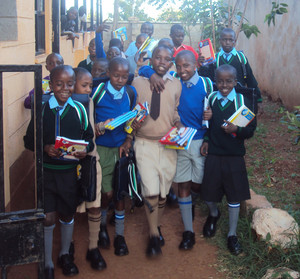Homeward Bound
 The small house was a beehive of activity, unusual for a Sunday afternoon in Kibera. A group of adults and children bustled about in the kitchen, preparing steamed rice, beef stew and cabbage sauté. A short while later they sat down to share lunch in the living room, chatting and sipping soda as they enjoyed their platefuls.
The small house was a beehive of activity, unusual for a Sunday afternoon in Kibera. A group of adults and children bustled about in the kitchen, preparing steamed rice, beef stew and cabbage sauté. A short while later they sat down to share lunch in the living room, chatting and sipping soda as they enjoyed their platefuls.
This simple meal was the centre point of a small celebration. The children were all former street boys rescued from the streets of Nairobi last year, and on this day, their parents and guardians had come to take them home after one year of rehabilitation at the Ndugu Mdogo Rescue Centre. Each boy was equipped with a schoolbag, schoolbooks and uniforms, and the Centre had already arranged for their placement in local schools.
This group of children was the first to graduate from a new accelerated rehabilitation method adopted at the Centre. The new approach aims to take children off the streets and reunite them with their parents or immediate guardians within one year by first tracing each child’s immediate relatives and then isolating the reason behind the child’s sojourn on the street.
This new approach was adopted after the Koinonia social workers realized that almost every child roaming the streets of Nairobi has a parent, an aunt, a grandmother or guardian somewhere. In most cases, they have simply adopted the drifter’s lifestyle as a recourse from an unbearable home environment.
Previously, a child would go through a one-year preparatory phase at the Rescue Centre before being transferred to one of the main Koinonia children’s homes for more comprehensive formation.
The rehabilitation process now starts right on streets. The social workers identify the children and create friendship with them. They engage the children in sporting activities and welcome them to drop by the Rescue Centre, whenever they can, for a hot meal and a bath.
With time, the children open up, and the social workers get a chance to understand the situation that drove them take to the streets. This information helps the social workers trace each child’s closest relative or guardian, with whose approval they admit the child into the Rescue Centre. The next step is then to tackle the immediate problem facing the child, often a drug addiction or the haunting effects of an abusive past.
The Rescue Centre’s Coordinator, Jack Matika, said the new approach was a success in its first year.
“We were able to reintegrate 27 out of the 30 children we admitted a year ago,” Jack said. “Only three children could not be reintegrated.”
Jack said the three children came from families with deep-seated problems that would certainly impede their reintegration, mostly issues around extreme deprivation, violence and abuse of alcohol. The three will be referred to Koinonia’s main children’s homes.
Back at the Rescue Centre, a few parents shed tears as they regarded their little boys, little angels who had previously vanished into the streets, now seated calmly in their brand new uniforms, ready to accompany them home and resume their schooling. Three Muslim boys made their parents very proud; they had faithfully progressed through their Madrasa (religious classes) at the local mosque without prodding from anyone.
There was one girl among the 27 children, a unique case. The girl, aged about 11, was not rescued from the streets. She was brought to the Centre by a neighbour to protect her from her father. The girl’s mother had abandoned the family, leaving her under the care of the father. Unfortunately, the father had slipped into depression and alcoholism, and on one night he arrived home extremely inebriated and tried to take advantage of his own daughter. Panicking, the girl escaped though the window and ran screaming to a female neighbour, who gave her shelter for the night and brought her to Ndugu Mdogo Rescue Centre the following morning.
“We usually admit only boys, but we felt we had to address her case too,” Matika said.
The social workers were fortunate enough to find her mother in another part of Kibera. The girl moved into her mother’s tiny shack and began attending counselling sessions at the Rescue Centre. Her formation was also successful and she is now a Grade Six pupil at a local school.
Jack and his fellow social workers will continue to follow the progress of the children after their reintegration. Every Saturday they will all assemble at the Rescue Centre to share their experiences. The social workers will pay regular visits to each child’s home and school to ensure everything is going well, and they have already discussed the temptation to run away from home and back to the freewheeling streets.
“We have tried our best to impart in them that running away does not solve anything,” Jack said. “Instead, we encouraged them to come to the Rescue Centre if they ever feel the urge to run away.”



